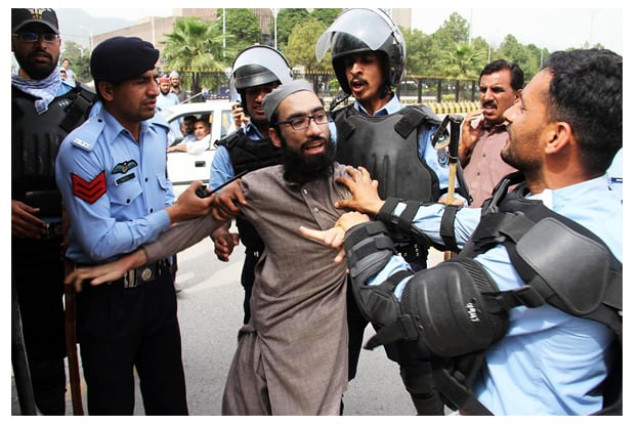Protest inside red zone turns into a sit-in
A spokesman of the PST claimed over 1,100 activists had been rounded up by the law enforcement agencies

PHOTO: ONLINE
The government had called in army troops a day earlier after thousands of supporters of Mumtaz Qadri, the executed killer of former Punjab governor Salmaan Taseer, forced their way into the high-security zone and laid siege to important installations.
Qadri supporters continue sit-in for second day outside Parliament
The protest, which initially began in Rawalpindi to mark 40 days of Qadri’s death, turned ugly after miscreants set fire to several vehicles on their way into the red zone.
The demonstration continued on Monday after turning into a sit-in with leaders of different religious parties joining in. The protesters have either burned the containers placed near D-Chowk to restrict their movement or pushed them aside to create space.
A stage has also been prepared for the religious leaders, who continued addressing the mob throughout the day. The protesters seem to be ready for a long haul as most of them have brought edibles and water with some of them even carrying rucksacks.
The leaders at the sit-in linked the initiation of negotiations with the government to the presence of two influential MPs of the ruling PML-N.
“We will talk only if Finance Minister Ishaq Dar and National Assembly Speaker Ayaz Sadiq are made part of the government’s team to hold negotiations with us over the demands presented by us on Sunday night,” Mufti Ghulam Ghous, a second-tier leader of Pakistan Sunni Tehreek told The Express Tribune.
The protesters were asked to talk with the local lawmaker, Tariq Fazl Chaudhry, to settle the matter, but they refused. The religious leaders have already refused to talk with the Islamabad chief commissioner.
A spokesman of the PST claimed over 1,100 activists had been rounded up by the law enforcement agencies. He warned of countrywide protests if the detained suspects were not released.
Ghous also hinted at staying at D-Chowk until their demands were met.
A senior city administration officer said talks with the protesters were underway on the government level. He rejected the idea of using force to disperse the protesters.
Many among the protesters carrying batons have been deputed as ‘security guards’ for the demonstration. Baton-wielding men also surrounded the stage to protect their leaders, who time and again warned the crowd not to disperse or they would be arrested.
The metro bus service, which caters to around 120,000 passengers between Islamabad and Rawalpindi daily, remained closed for the second consecutive day owing to the protest. Public transport also remained scarce, multiplying the difficulties for citizens. Cellphone services were suspended in Islamabad because of security concerns between 9am and 6pm.
Insiders in the ruling Pakistan Muslim League-Nawaz (PML-N) told The Express Tribune that the PM had not taken the sit-in outside the parliament lightly.
While chairing a high-level meeting in Lahore, the PM tasked Intelligence Bureau Director General Aftab Sultan, Punjab IGP Mushtaq Sukhera and Interior Minister Chaudhry Nisar to tackle the situation without compromising on the government’s writ.
Major arteries of Islamabad, Rawalpindi blocked as pro-Qadri protesters storm Red Zone
The insiders said the premier would himself monitor the sit-in as the party leadership believed the protest might be used as a bargaining tool.
Expressing displeasure over the violence, the interior minister has ordered the Islamabad administration to take immediate measures to restore routine life in the capital.
Published in The Express Tribune, March 29th, 2016.



















COMMENTS
Comments are moderated and generally will be posted if they are on-topic and not abusive.
For more information, please see our Comments FAQ